
Trump Nominee For CIA Chief Linked To Torture Policies
Let’s be real. Running the CIA is a dirty job. We don’t want a boy scout doing it (or in the case of Trump nominee Gina Haspel, a girl scout). Having said that, many people believe that the United States Intelligence Community crossed a line during the Bush Administration that caused substantially more harm than good (both in terms of intelligence gathering and our national integrity). When the CIA and other American agencies tortured prisoners, we committed acts that cannot be defended with a clear conscience. Following WWII, Japanese war criminals were executed for performing the same acts of brutality against Allied Soldiers in war time that our agencies committed when we used water boarding against accused enemy combatants. The Bush Administration justified the exact same actions by changing the name from water boarding to “enhanced interrogation techniques”. During the 2016 Presidential Campaign, Donald Trump defended the practice of water boarding. He backed up that sentiment when he nominated Gina Haspel to take over the top job at the CIA. Some are applauding this move saying it empowers women (she will be the first woman to hold the CIA’s top post if confirmed). In 1945, she would not have had a chance to hold this post. She would however be a war criminal by our standards at the times. It’s hard to call that progress.
WASHINGTON — Just over a year after the Sept. 11 attacks, the C.I.A. dispatched the veteran clandestine officer Gina Haspel to oversee a secret prison in Thailand. Shortly after, agency contractors in the frantic hunt for the conspirators waterboarded a Qaeda suspect three times and subjected him to brutal interrogation techniques.
Ms. Haspel’s time running the prison, code-named Cat’s Eye, began her deep involvement in the agency’s counterterrorism operations and showed her willingness to take part in the agency’s rendition, detention and interrogation program, which shaped her career. She was a rising star until that dark chapter in C.I.A. history began to emerge publicly.
But under President Trump, her fortunes changed, and on Tuesday, he announced that he intended to name her director of the C.I.A.
With his elevation of Ms. Haspel, now the agency’s deputy director, Mr. Trump displayed a willingness to ignore the widespread denunciations of waterboarding, sleep deprivation, confinements in boxes and other interrogation techniques that were used by the C.I.A. more than a decade ago.
Her nomination is certain to reignite the wrenching debate over their use and the resulting psychological damage for terrorism suspects. Though lawmakers, human rights activists and others eventually condemned the interrogation methods as torture, the program had defenders. Among them was Mr. Trump, who vowed during his campaign to bring back waterboarding and once said that “torture works,” though he later backed off that declaration.



